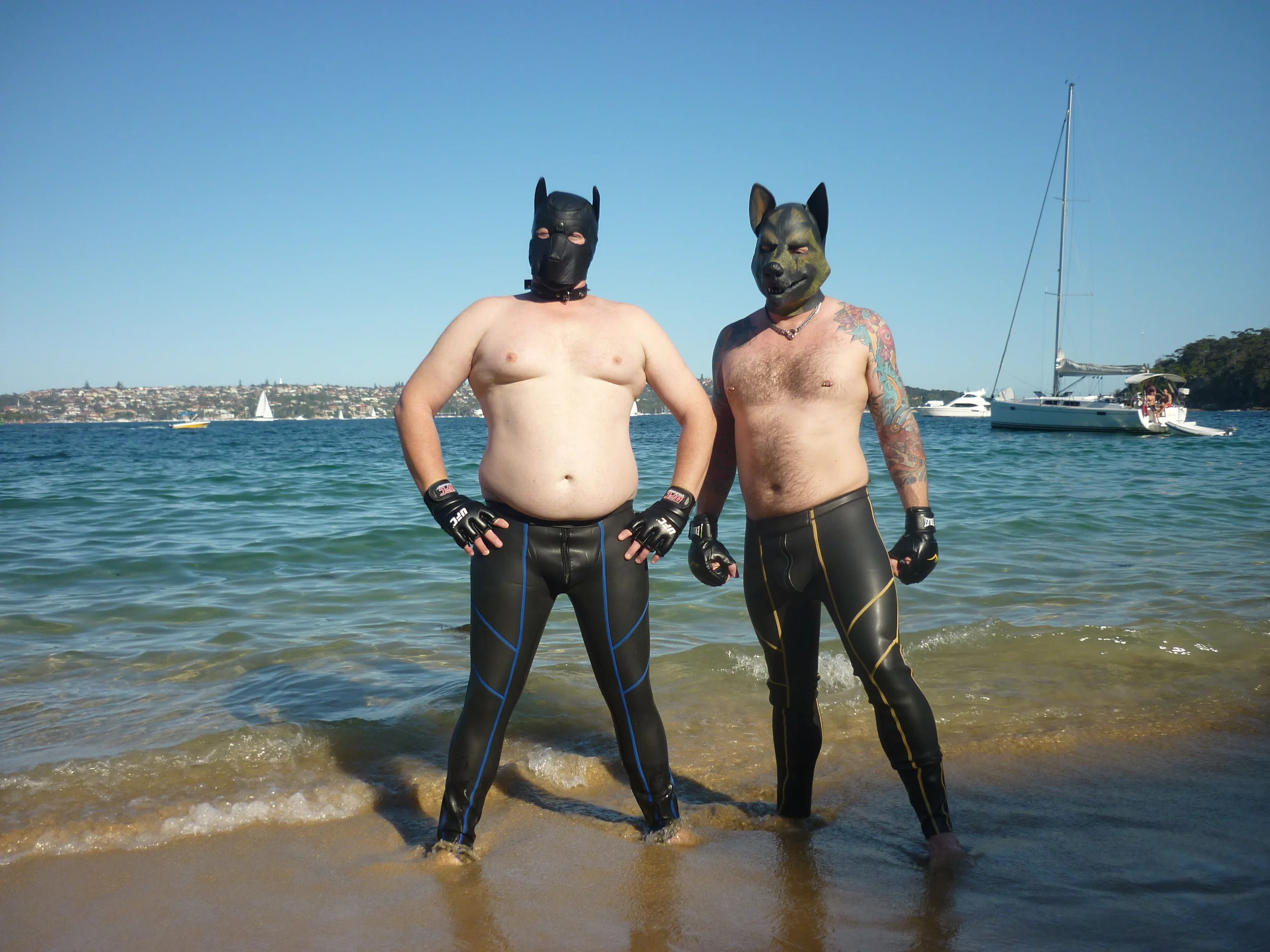Ask any dog owner and they will tell you their pet 'smiles'; their dog shows happiness, joy, even mirth according to them. Ask many people involved in human pup play if their pup smiles, and they will respond with an "of course! Pup play is fun!"
It is a fairly reasonable assumption for everyone to make that human pup play is pleasurable for those involved. The exact nature of the pleasure, the fun they describe they are having, will vary from person to person. Despite the lack of consistent metrics for what this fun is, a lot of people into pup play claim it is fun focused. This claim needs scrutiny to better explain what is actually happening in human pup play.
At the outset we need to separate fun and pleasure as outcomes. They need not be mutually exclusive - for many people fun and pleasure are entwined, like eating popcorn watching a hilarious movie. Describing them as separate does not imply they must be or it is ideal for it to be so. Merely that in the specific case of human pup play it is helpful to differentiate pleasure from fun.
Pleasure is very important in BDSM, fun is not. Intimacy, whether leading to sexual arousal or not, is pleasurable but not exactly fun. You can get hard and horny and not laugh or smile. In this case, human pup play is unusual - like tickling play - in that it most certainly brings humour and fun to conventional BDSM for a lot of people. Yet, it is perfectly possible to engage in human pup play for pleasure and it not to be fun or humorous at all. A point that will be reiterated with good reason later.
At this early beginning of discussion the use of the word 'fun' is a problem. Many english speakers use it as a synonym for pleasure. Indeed, 'fun', and 'funny', can be used to mean what is pleasurable, humorous, playful, witty, enlivening, even nonsensical. Given that pup play involves pretending to be a dog and looking ridiculous - any tail in the arse looks silly on some level - the word 'fun' can indeed be used to describe pup play properly. But like they say in the Princess Bride movie, " you use that word a lot. I do not think it means what you think it means".
To understand human pup play better we all can benefit from comprehending and acknowledging that pleasure, and fun, are different things. Though they can occur together, they most certainly can and do occur separately in human pup play.
Pleasure as part of pup play can be assumed to be there almost any time. It is such an actively pervasive part of BDSM, if not every persons daily actions, that we can reasonably assume that people look for pleasure in what they do - they will work and endure as they must, but given opportunity and resources, they seek pleasure. At this point the denying monks shake their heads. That is ok. Chastity in BDSM is pleasure, just not so directly. So, we can all rationally and sensibly assume that pleasure seeking must be part of the motivation to engage in pup play, if not the outcome of doing so.
Fun is a playfulness, a behaving with vitality and humour. It is most often associated with an innocence, a carefree spirit, a good mood. We tend to believe fun and carefree behaviour reflects a kinder and 'good' heart. Look back to the smiling dog , and see that we want to see a good nature in the pet when we see it 'smile'. That the dog is regulating its heat and being alert to new activity doesn't matter to the human owner, because they see a smile and then project onto the dog the idea the dog is having 'fun'. That the dog is happy, good.
This happens in human pup play too. Owners and trainers, handlers, even other pups, project onto pups the 'fun'. If a dog smiles at playing with a ball, surely a human pup should too? It is helpful to understand it is 'human' pup play. Most of the time humans show faces of grim determination in ball play, not big happy grins with our tongues lolling out. We often project onto a pup, or a dog, what we want to see - not what is actually happening. And because 'fun' is associated with 'good', we easily rationalise that its ok to do this.
Playfulness and fun truly can be so easily projected, that is placed as occurring for someone when it is really just what the owner or trainer who threw the ball or gave the pat expects to see. This is not to say that smiling doesn't happen under the hood when a pups patted. It is simply that the projection, the expectation of happiness and fun, needs to be acknowledged that the viewer is projecting at least some of the time.
So if fun doesn't have to be there in human pup play, and it can easily be projected onto a human pup when it isn't happening, who do so many players of pup play claim that fun is so important?
Firstly, many people simply use fun to mean pleasurable. Lacking a precise definition of fun and pleasure, the human pup player interchanges the terms. This is a not a fault of theirs rather a symptom of a convoluted language they are thinking in.
Secondly, another reason is that pup play is 'fun' in action for many people. It is 'play', an activity of playfulness. Yet this element, 'play' - 'fun', does bear further examination.
The fun and play of human pup play is often meant to be a generally interactive style. Pups rarely have 'fun' 'playing' alone. More than simply requiring company, often the expectation is that a pup will be cheerful, a pup will respond well and positively to a smiling owner or handler, and a pup will be coaxed to cheerfulness if not in that state already. This expectation is best not described as 'having fun'. It is all the demanding expectation of the owner of handler after all. This described expectation of a pup being ready and having fun is best redefined properly as expecting a pup to be in 'good humour'. Understanding what 'good humour' is helps us understand the practices of human pup play better, rather than simply projecting and lazily assuming it's all fun.
It may seem strange or confronting to speak of 'fun' as something expected, something almost demanded in pup play. Yet, consider how a master, how a pup, behaves when something is 'not fun'. The failure to deliver fun can be poisonous and unnecessarily negative in a pup play experience. By understanding 'humour' as the term rather than 'fun' we can find ways to sidestep the negative of 'no fun' and its often drastic consequences.
Before this becomes too confusing, let's clarify- 'no fun' simply means an absence of 'fun' when it is expected to be there. Keep in mind that experiencing pleasure and intimacy in human pup play doesn't have to involve fun or playfulness. Yet, the trait of 'good humour' can be very helpful even when fun is not present.
You can have a good pleasurable time at pup play, but no fun, and having good humour can help in play.
Good humour in pup play simply means recognising the ridiculous - that a human is pretending to be a dog - and enjoying that incongruity, rather than being confused or repelled by it. Playfully recognising the impossible, a human pup and their master indulge in play with a preparedness to pretend there is a canine present, who really isn't a canine, but it's not so serious - we are allowing a false reality to exist for play, an illusion and fantasy which gives pleasure.
Those without good humour are obvious in that they reject this premise, they react with derision, disbelief, hostility, even disgust. A person with good humour not only indulges in the fantasy and plays along, they also can react to the negative and other adversities with light heartedness, by joking. The good humoured won't let someone being gloomy or negative take away their sense of humour, their fun, their play.
Because straightforwardly pup play is funny. It is ridiculous. It is absurd. It requires good humour to participate in, to go along for the ride of make believe of what is happening. It may not be 'fun' all the time, but it is always 'funny'.
Too often in BDSM, sarcasm, cruel wit and derision become common conversational practice. Human pup play can remind everyone that approaching things with good humour helps us find the fun, the pleasure, in what we do in BDSM. It can be a laugh when a tail pops out accidentally, it can cause us to smile when a pup is affectionate. Not because pup play is 'fun', but because with good humour in our hearts we can find the funny in it all, and smile really.




